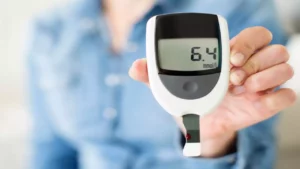Living with high blood sugar can be challenging, requiring a thoughtful and proactive approach to treatment and management. Whether you’re newly diagnosed or seeking additional insights into controlling your blood sugar levels, this blog aims to provide a comprehensive guide to help you navigate the journey to better health. From lifestyle adjustments to medical interventions, we’ll explore a range of high blood sugar treatment strategies designed to empower you in taking control of your high blood sugar and fostering a healthier, more balanced life.
Contents
How To Know If My Blood Sugar Is High?
 Recognizing the signs of high blood sugar is essential for individuals. Especially those with diabetes or at risk for diabetes. Here are common indicators that your blood sugar may be elevated:
Recognizing the signs of high blood sugar is essential for individuals. Especially those with diabetes or at risk for diabetes. Here are common indicators that your blood sugar may be elevated:
- Frequent Thirst and Increased Urination: High blood sugar can lead to increased thirst (polydipsia) and frequent urination (polyuria) as the body attempts to eliminate excess glucose through urine.
- Persistent Fatigue: Elevated blood sugar levels can affect energy levels. Hence, leading to persistent fatigue and feelings of weakness.
- Blurry Vision: Changes in vision, such as blurriness, may occur when high blood sugar levels affect the fluid balance in the lenses of the eyes.
- Unexplained Weight Loss: Sudden and unexplained weight loss may occur when the body starts breaking down muscle and fat for energy due to insufficient insulin action.
- Slow Wound Healing: High blood sugar can impair the body’s ability to heal. This leads to slow wound recovery and an increased risk of infections.
- Increased Hunger: Experiencing persistent hunger, even after meals, can be a sign of insulin resistance and elevated blood sugar.
- Irritability and Mood Swings: Fluctuations in blood sugar levels can affect mood and lead to irritability, anxiety, or mood swings.
- Tingling or Numbness: Peripheral neuropathy, characterized by tingling or numbness in the hands and feet, can be a consequence of prolonged high blood sugar.
- Headaches: Elevated blood sugar levels may contribute to headaches and difficulty concentrating.
- Darkened Skin Patches: A condition called acanthosis nigricans, characterized by darkened and thickened skin patches, may indicate insulin resistance and elevated blood sugar.
It’s important to note that these symptoms can vary among individuals. Thus, some people may not experience noticeable signs even with elevated blood sugar levels. Regular monitoring of blood sugar levels through blood tests is the most accurate way to determine if your levels are within a healthy range.
What Are Some High Blood Sugar Treatment Options?
High blood sugar treatment typically involves a combination of lifestyle modifications, medication, and regular monitoring. Treatment options may vary based on the underlying cause of elevated blood sugar levels and the individual’s health condition. Here are some common high-blood sugar treatment options:
Medication
For many individuals with high blood sugar, medication plays a crucial role in managing glucose levels. Oral medications are often prescribed, and the choice depends on factors such as the type of diabetes and the person’s overall health. Metformin, for example, is a common first-line medication that improves insulin sensitivity and reduces glucose production by the liver. Other classes of medications, such as sulfonylureas and DPP-4 inhibitors, may be prescribed based on individual needs.
Insulin Sensitizers
Insulin sensitizers, like metformin, are medications that enhance the body’s response to insulin. By improving insulin sensitivity, these drugs help cells absorb glucose more effectively. Metformin, in particular, is often prescribed for individuals with type 2 diabetes to lower blood sugar levels and improve overall insulin function. It is usually well-tolerated and has additional benefits. Such as promoting weight loss.
GLP-1 Receptor Agonists
GLP-1 receptor agonists are a class of medications that mimic the action of the naturally occurring hormone GLP-1. They stimulate insulin release and inhibit glucagon, resulting in lower blood sugar levels. Additionally, GLP-1 receptor agonists can reduce appetite and aid in weight management. These medications are commonly used in the treatment of type 2 diabetes.
SGLT-2 Inhibitors
Sodium-glucose co-transporter 2 (SGLT-2) inhibitors are medications that work in the kidneys to reduce glucose reabsorption, allowing excess glucose to be excreted through urine. By promoting the elimination of glucose, SGLT-2 inhibitors help lower blood sugar levels. These medications are often prescribed for people with type 2 diabetes and have shown benefits in reducing cardiovascular risks.
Regular Blood Sugar Monitoring
 Monitoring blood sugar levels is a fundamental aspect of diabetes management. Regular self-monitoring using glucose meters or continuous glucose monitoring (CGM) devices allows individuals to track how their bodies respond to various factors such as food, physical activity, and medication. This information helps healthcare providers make informed decisions about treatment adjustments and lifestyle recommendations.
Monitoring blood sugar levels is a fundamental aspect of diabetes management. Regular self-monitoring using glucose meters or continuous glucose monitoring (CGM) devices allows individuals to track how their bodies respond to various factors such as food, physical activity, and medication. This information helps healthcare providers make informed decisions about treatment adjustments and lifestyle recommendations.
Weight Management
Achieving and maintaining a healthy weight is a key component of blood sugar control, especially for individuals with type 2 diabetes. Excess body weight can contribute to insulin resistance, making it harder for cells to respond to insulin. Weight management strategies include a balanced diet, regular exercise, and lifestyle modifications tailored to individual needs.
Stress Management
Chronic stress can impact blood sugar levels through the release of stress hormones like cortisol. Implementing stress management techniques is essential for overall well-being. Practices such as meditation, deep breathing exercises, and yoga can help reduce stress and improve blood sugar control.
Education and Support
Education and support are vital aspects of managing high blood sugar. Individuals with diabetes benefit from understanding their condition, treatment options, and lifestyle modifications. Healthcare professionals, dietitians, and diabetes educators provide valuable information and support to empower individuals to make informed decisions about their health. Regular check-ups and ongoing communication with the healthcare team are essential. This will ensure that the treatment plan remains effective and can be adjusted as needed.
Individuals with high blood sugar or diabetes must work closely with their healthcare team to develop a personalized treatment plan. Treatment strategies may need adjustments over time based on individual responses and changes in health status. Consistent monitoring and adherence to the prescribed treatment plan are key components of successful blood sugar management.
What Drinks Bring Blood Sugar Down?
 Several drinks may help stabilize blood sugar levels or have a positive impact on glucose metabolism. It’s important to note that individual responses to these beverages can vary. People with diabetes or those managing high blood sugar levels should consult with healthcare professionals for personalized advice. Here are some drinks that may potentially contribute to blood sugar regulation:
Several drinks may help stabilize blood sugar levels or have a positive impact on glucose metabolism. It’s important to note that individual responses to these beverages can vary. People with diabetes or those managing high blood sugar levels should consult with healthcare professionals for personalized advice. Here are some drinks that may potentially contribute to blood sugar regulation:
- Green Tea
Green tea contains antioxidants, such as catechins. This may have beneficial effects on insulin sensitivity and blood sugar control. Drinking unsweetened green tea can be a healthy choice.
- Herbal Teas
Certain herbal teas, such as chamomile or cinnamon tea, are caffeine-free and may have mild blood sugar-lowering properties. However, it’s important to choose herbal teas without added sugars.
- Black Coffee
Black coffee, without added sugars or high-calorie creamers, is low in calories and may have potential benefits for blood sugar regulation. Some studies suggest that coffee consumption may be associated with a lower risk of developing type 2 diabetes.
- Apple Cider Vinegar (ACV) Drinks
Some studies suggest that apple cider vinegar may improve insulin sensitivity and help lower post-meal blood sugar levels. It can be diluted in water or mixed with other beverages. However, it’s crucial to consult with a healthcare professional before incorporating ACV into the diet. Especially for those with certain health conditions.
- Vegetable Juice
Freshly squeezed vegetable juices, especially those with non-starchy vegetables like kale, spinach, and cucumber, can provide essential nutrients without causing a rapid spike in blood sugar levels. Be cautious with fruit juices. Hence, they can be high in natural sugars.
- Lemon Water
Lemon water is a refreshing and low-calorie drink that can be consumed throughout the day. Some studies suggest that the polyphenols in lemons may have positive effects on insulin sensitivity.
- Low-fat milk or Dairy Alternatives
Dairy products, such as low-fat milk or unsweetened almond milk, provide essential nutrients like calcium and vitamin D without significantly impacting blood sugar levels. It’s important to choose unsweetened versions.
It’s crucial to be mindful of added sugars and sweeteners in beverages. Thus, these can lead to rapid spikes in blood sugar levels. Additionally, individual responses to drinks can vary. So it’s advisable to monitor blood sugar levels and consult with healthcare professionals for personalized guidance.
Conclusion
In conclusion, high blood sugar treatment requires a holistic approach involving lifestyle changes, medication, and regular monitoring. By adopting a balanced diet, engaging in regular physical activity, and staying well-hydrated with options, individuals can positively impact their blood sugar levels. Also, medications play a crucial role in controlling blood sugar, and their usage should be guided by healthcare professionals.
Hence, incorporating stress management techniques and seeking support from healthcare providers contribute to overall well-being. Remember, it’s essential to consult with healthcare professionals for personalized advice. Hence, ensuring an effective and sustainable approach to blood sugar management. Do you want to get rid of diabetes? Join our online diabetes treatment program and reverse Diabetes naturally through lifestyle changes such as a Personalized Diet plan, Exercise, Yoga, dieticians, and health coaches.

